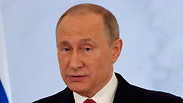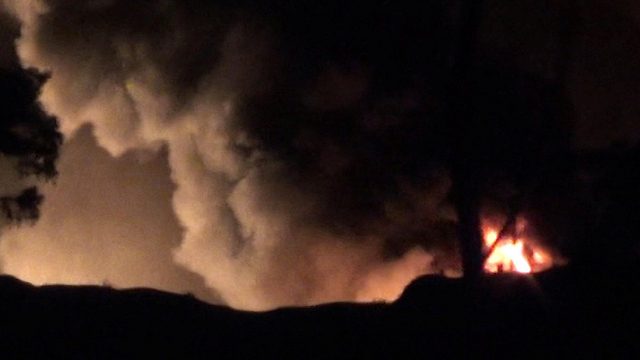
Russian President Vladimir Putin. Not a slip of the tongue
Photo: AP

Even Russia understands alleged Israeli strikes in Syria
Analysis: Unlike previous incidents, the attack that took place in the Damascus area over the weekend prompted an official Russian representative to say that ‘Israel is naturally fighting organizations jeopardizing its security.’ In other words, even Moscow understands that Israel will not allow the fighting in Syria to spill over to the Golan Heights.
In recent weeks, Israel has been intensifying its dialogue with the Russians, both on the diplomatic level and on the practical level, on Syrian soil. Prime Minister Benjamin Netanyahu often talks to Russian President Putin, but at the same time Israel was accused over the weekend of striking near the Mezzeh Military Airport in the Damascus area.
These two channels are directed at one place: The negotiations over Syria's fate, which will begin in Kazakhstan on January 23.
Israel has not been invited to this conference, but it wants its presence there to be felt. For that reason it is conveying, through all channels, that no agreement can be reached—especially not on the future of the Golan Heights—without taking Israel’s interests into account.
For a long time, from the moment the Russians deployed in Syria in September 2015, the global media stopped reporting about Israeli strikes in the heart of the country. The silence ended last November, however, with a series of reports on attacks that lasted until the first week of December and were attributed to Israel. None of these strikes, which were carried out at the height of the Russian effort to conquer Aleppo, was mentioned in the Russian media and in the Russian army’s reports.
Aleppo falls, the Russians start organizing a summit in Kazakhstan, there’s another report about an Israeli strike, and suddenly the entire Russian media are quoting the official Syrian statement about the Israeli strike. Moreover, for the first time, an official representative of the Russian government addresses the alleged Israeli strikes directly, and surprisingly he understands Israel.
In the semi-official newspaper of the Putin's regime, Izvestia, Deputy Chairman of the Duma Committee on international Affairs Andrei Klimov is quoted as saying: “Israel is using the armed forces to fight organizations which is sees as a danger to its security… The latest Israeli strike has nothing to do with the current conflict in Syria but with the historical conflict between Israel, Syria and Lebanon.” He also points an accusatory finger at the Hezbollah organization, without mentioning its name: “Tel Aviv is, naturally, fighting the terror organizations that are participating in the fighting in Syria.”
This isn’t a slip of the tongue or pen. It’s an official Russian signal at the Iranians and Hezbollah, which are currently at odds with the Russians over the arrangements in Syria. Israel has one clear interest here: To curb the attempts made by the Syrian regime in recent weeks to return to the Golan Heights, both by fighting and through negotiations with the rebels.
The Syrians are also trying to gain diplomatic capital from this strike. Unlike in the past, they are pointing at Israel, turning to the United Nations Security Council and leaking that the latest attack was carried out by F-35 planes. But F-35 planes have no advantage over the abilities that Israel has today to strike deep within Syria, and it has no need to use a plane which arrived a month ago and has yet to gain any operational experience anywhere in the world. The Syrians are likely trying to embarrass the American administration: You gave the Israelis a sophisticated weapon and now, here they are, using it immediately to inflame the conflict in the Middle East.
Since 2006, Hezbollah has been making quite organized multi-year arming and power building plans. The emphasis in the past few years is on building strategic systems based on a shift from long-range rockets with large warheads to accurate surface-to-surface missiles with a range of hundreds of kilometers. They could also be in the form of cruise missiles or unmanned aerial vehicles produced in Iran. It’s unclear which of these weapons have already reached Hezbollah.
The airstrikes attributed to Israel in Damascus are likely part of the attempt to curb this growing power. The Iranians and Hezbollah are trying to evade the Israeli intelligence, which is monitoring these shipments. Israel, for its part, reacts every time it detects a breach. For now, even the Russians understand us.

















